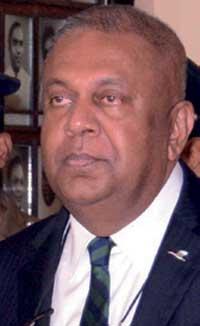Reply To:
Name - Reply Comment
Criticizes Govt’s slow reaction to curb danger
 By Yohan Perera
By Yohan Perera
Former Minister of Finance Mangala Samaraweera yesterday urged the government to revoke the gazette notification declaring the general election and called for the reconvening of Parliament.
Mr. Samaraweera said this in the following statement he issued yesterday.
We can all take encouragement and hope from the doughty and cooperative spirit that we have demonstrated at this time. By and large, the Sri Lankan people and our state have risen to the challenge. Doctors and nurses - the generals and soldiers of our collective fight against the virus have been doing an extraordinary job. They are at the front-lines, putting themselves at risk to keep us all safe.
Unfortunately, this is not entirely true of our government. First, the Government initially ignored a number of warnings, including warnings raised in Parliament, and failed to take adequate preventative measures, such as in the case of inbound travellers from Italy. Even more worryingly, a tourism promotion video was made by parties close to the very top of the Government just as the pandemic was spreading through the world. There are also reports that persons near and dear to those in positions of power and responsibility have been sent through the VIP lounge to avoid the screening and quarantine process. Once the WHO raised the alarm, the response has been largely swift and effective. We welcome the fact that the government is following scientific and public health advice.
There is also the question of the rule-of-law. The relevant public health legislation and emergency, such as the Quarantine Act, gives the government the powers it needs to fight this virus. But it also specifies how those powers need to be exercised in order to prevent abuse. Therefore, it is my duty to ask, what regulations has the Minister of Health issued to give the curfew legal effect? What legal sanction the government took to punish curfew-violators? In fact, the Government has an obligation to publish online all the regulations, whether old or new, that are currently being used to manage this situation.
Fourth, although it is not yet apparent, perhaps the gravest error which the Government has made is, its failure to convene Parliament. A pandemic of this magnitude calls for the entire system of governance to work together. There is only so much the President, Prime Minister and Cabinet can do alone. This will become all the more visible should the pandemic mutate into an economic crisis. In order for Sri Lanka to meet both these challenges, it needs to have all arms of government active and working.
Without Parliament, the government is fighting the virus and its effects with one-hand tied. Without legislative approval, the debt-ceiling cannot be raised to provide economic relief. Nor can any other economic relief measure involving government revenue or expenditure.
By depriving Parliament of the opportunity to meet the Government is - entirely avoidably and very irregularly - taking public finance into its own hands. This is even more true, because, unlike in 2015 when a budget was passed before polls, the government failed to pass a budget before declaring elections.
Even if Parliament, on public health grounds, cannot meet as a full House, there are other alternatives. The minimum quorum for Parliament to meet is 20. By mutual agreement, those 20 members can reflect the composition of Parliament. For example in New Zealand, a Parliamentary Select Committee will function throughout the lockdown to ensure the Government remains accountable to its citizens.
In order for Sri Lanka to meet both these challenges, it needs to have all arms of government active and working